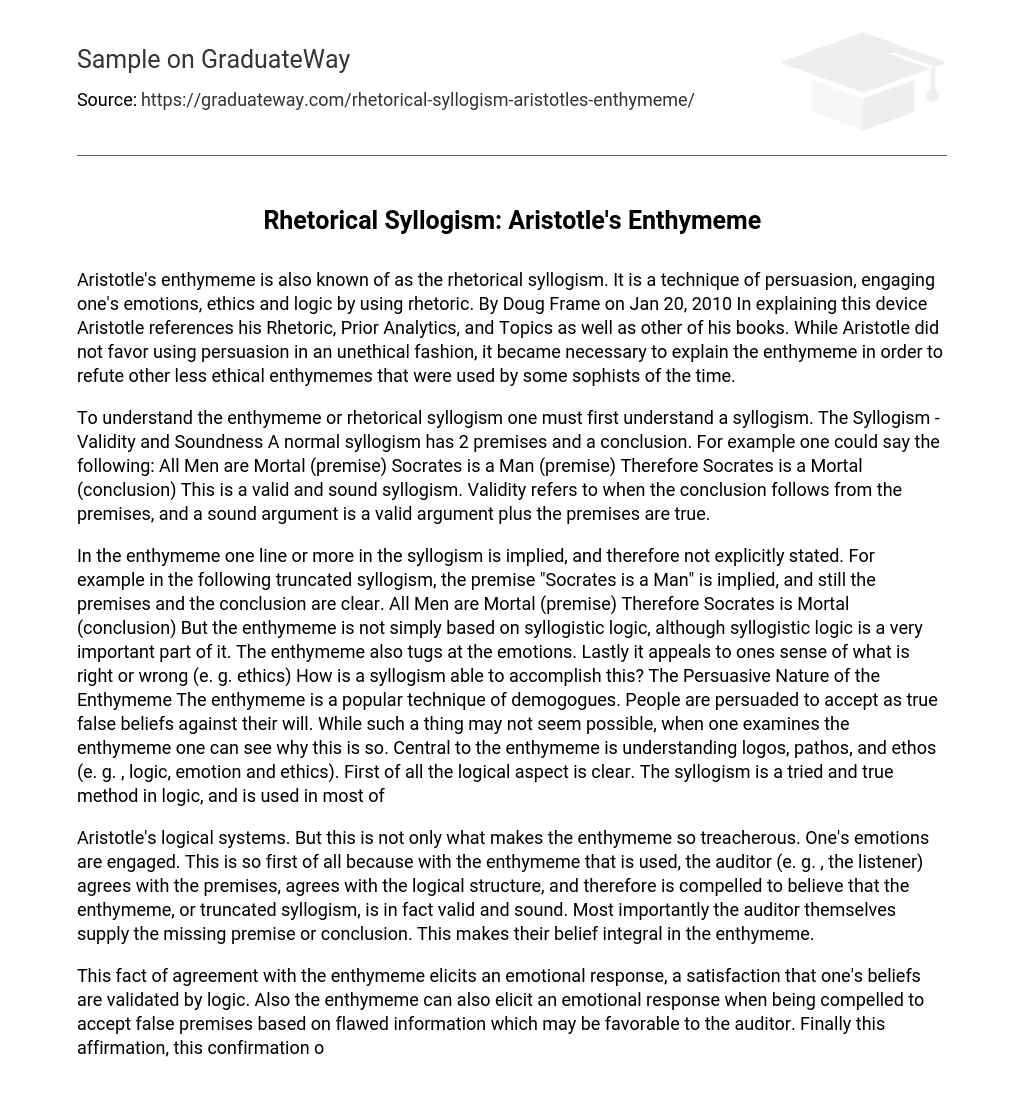Aristotle’s enthymeme is also known of as the rhetorical syllogism. It is a technique of persuasion, engaging one’s emotions, ethics and logic by using rhetoric. By Doug Frame on Jan 20, 2010 In explaining this device Aristotle references his Rhetoric, Prior Analytics, and Topics as well as other of his books. While Aristotle did not favor using persuasion in an unethical fashion, it became necessary to explain the enthymeme in order to refute other less ethical enthymemes that were used by some sophists of the time.
To understand the enthymeme or rhetorical syllogism one must first understand a syllogism. The Syllogism – Validity and Soundness A normal syllogism has 2 premises and a conclusion. For example one could say the following: All Men are Mortal (premise) Socrates is a Man (premise) Therefore Socrates is a Mortal (conclusion) This is a valid and sound syllogism. Validity refers to when the conclusion follows from the premises, and a sound argument is a valid argument plus the premises are true.
In the enthymeme one line or more in the syllogism is implied, and therefore not explicitly stated. For example in the following truncated syllogism, the premise “Socrates is a Man” is implied, and still the premises and the conclusion are clear. All Men are Mortal (premise) Therefore Socrates is Mortal (conclusion) But the enthymeme is not simply based on syllogistic logic, although syllogistic logic is a very important part of it. The enthymeme also tugs at the emotions. Lastly it appeals to ones sense of what is right or wrong (e. g. ethics) How is a syllogism able to accomplish this? The Persuasive Nature of the Enthymeme The enthymeme is a popular technique of demogogues. People are persuaded to accept as true false beliefs against their will. While such a thing may not seem possible, when one examines the enthymeme one can see why this is so. Central to the enthymeme is understanding logos, pathos, and ethos (e. g. , logic, emotion and ethics). First of all the logical aspect is clear. The syllogism is a tried and true method in logic, and is used in most of
Aristotle’s logical systems. But this is not only what makes the enthymeme so treacherous. One’s emotions are engaged. This is so first of all because with the enthymeme that is used, the auditor (e. g. , the listener) agrees with the premises, agrees with the logical structure, and therefore is compelled to believe that the enthymeme, or truncated syllogism, is in fact valid and sound. Most importantly the auditor themselves supply the missing premise or conclusion. This makes their belief integral in the enthymeme.
This fact of agreement with the enthymeme elicits an emotional response, a satisfaction that one’s beliefs are validated by logic. Also the enthymeme can also elicit an emotional response when being compelled to accept false premises based on flawed information which may be favorable to the auditor. Finally this affirmation, this confirmation of the auditor to this unsound truncated syllogism convinces the auditor to agree with the rhetor (e. g. , the rhetorician) about issues that concern society.
The auditor is convinced that this truncated syllogism appeals to them directly and is enshrined in logic, and the auditor can then go so far as to believe that the false agreement with this syllogism goes on to validate oneself and their standing in the community (e. g. , ethos). An Example of an Enthymeme Take the following example: Former President George H. W Bush offered the following enthymeme when opposing the Civil Rights Bill of 1991. He explicitly states the observation only. Observation: The bill will promote the use of quotas in the workplace.
Generalization: Quotas give unearned opportunities to minorities. Inference: White’s opportunities will unfairly be given to minorities if the bill passes. His audience was his fellow Republicans composed disproportionately of whites compared to the Democratic Party. Yet this enthymeme could have a very different meaning if given to an audience composed of minorities. For example: Observation: The bill will promote the use of quotas in the workplace. Generalization: Quotas insure that earned opportunities will be given to minorities. Inference: Minorities will be treated fairly in the hiring process.
Is the Enthymeme Ethical? Enthymemes are persuasive independent of the facts of the matter. But it is only ethical when the truncated premise or conclusion is used with the full knowledge of the auditor, that is where the meaning of the missing premise or conclusion is clearly understood. The facts in the world, determine if the enthymeme not only appears to be ethical, but in fact is ethical. A side note in dealing with enthymemes in general; by identifying the erroneous implied premises one can in fact refute unethical enthymemes by constructing your own. So have at it!
Sources:
Aden, Roger C. The Enthymeme as Postmodern Argument Form: Condensed, Mediated Argument Then and Now. Argumentation and Advocacy 31, no. 2 (Fall 1994): 59. Barnes, Jonathan Ed. The Complete Works of Aristotle: The Revised Oxford Translation. Bollingen Series LXXI, Princeton University Press 1995 Frame, Doug., The Logical Nature of Aristotle’s Enthymeme. Masters Thesis 1998 Copyright Doug Frame
http://suite101.com/article/what-is-the-rhetorical-syllogism-a192086





